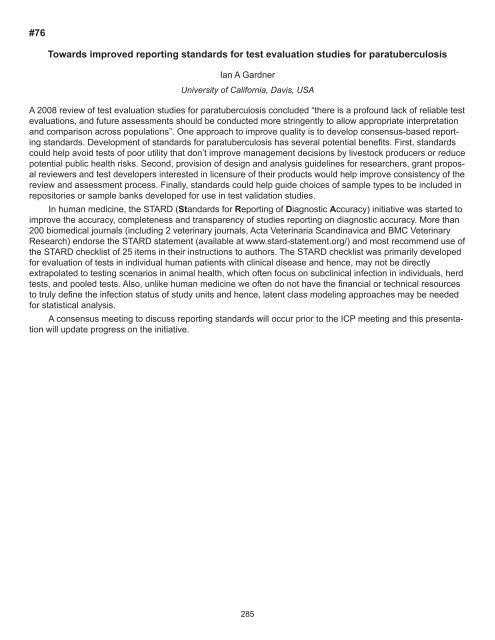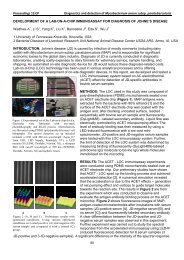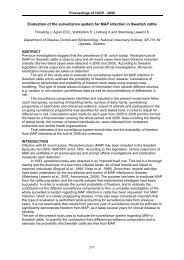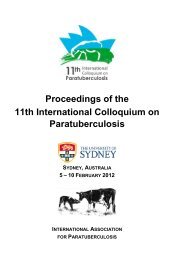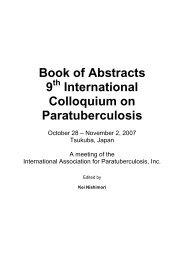Proceedings of the 10th International Colloquium on Paratuberculosis
Proceedings of the 10th International Colloquium on Paratuberculosis
Proceedings of the 10th International Colloquium on Paratuberculosis
Create successful ePaper yourself
Turn your PDF publications into a flip-book with our unique Google optimized e-Paper software.
#76<br />
Towards improved reporting standards for test evaluati<strong>on</strong> studies for paratuberculosis<br />
Ian A Gardner<br />
University <str<strong>on</strong>g>of</str<strong>on</strong>g> California, Davis, USA<br />
A 2008 review <str<strong>on</strong>g>of</str<strong>on</strong>g> test evaluati<strong>on</strong> studies for paratuberculosis c<strong>on</strong>cluded “<str<strong>on</strong>g>the</str<strong>on</strong>g>re is a pr<str<strong>on</strong>g>of</str<strong>on</strong>g>ound lack <str<strong>on</strong>g>of</str<strong>on</strong>g> reliable test<br />
evaluati<strong>on</strong>s, and future assessments should be c<strong>on</strong>ducted more stringently to allow appropriate interpretati<strong>on</strong><br />
and comparis<strong>on</strong> across populati<strong>on</strong>s”. One approach to improve quality is to develop c<strong>on</strong>sensus-based reporting<br />
standards. Development <str<strong>on</strong>g>of</str<strong>on</strong>g> standards for paratuberculosis has several potential benefits. First, standards<br />
could help avoid tests <str<strong>on</strong>g>of</str<strong>on</strong>g> poor utility that d<strong>on</strong>’t improve management decisi<strong>on</strong>s by livestock producers or reduce<br />
potential public health risks. Sec<strong>on</strong>d, provisi<strong>on</strong> <str<strong>on</strong>g>of</str<strong>on</strong>g> design and analysis guidelines for researchers, grant proposal<br />
reviewers and test developers interested in licensure <str<strong>on</strong>g>of</str<strong>on</strong>g> <str<strong>on</strong>g>the</str<strong>on</strong>g>ir products would help improve c<strong>on</strong>sistency <str<strong>on</strong>g>of</str<strong>on</strong>g> <str<strong>on</strong>g>the</str<strong>on</strong>g><br />
review and assessment process. Finally, standards could help guide choices <str<strong>on</strong>g>of</str<strong>on</strong>g> sample types to be included in<br />
repositories or sample banks developed for use in test validati<strong>on</strong> studies.<br />
In human medicine, <str<strong>on</strong>g>the</str<strong>on</strong>g> STARD (Standards for Reporting <str<strong>on</strong>g>of</str<strong>on</strong>g> Diagnostic Accuracy) initiative was started to<br />
improve <str<strong>on</strong>g>the</str<strong>on</strong>g> accuracy, completeness and transparency <str<strong>on</strong>g>of</str<strong>on</strong>g> studies reporting <strong>on</strong> diagnostic accuracy. More than<br />
200 biomedical journals (including 2 veterinary journals, Acta Veterinaria Scandinavica and BMC Veterinary<br />
Research) endorse <str<strong>on</strong>g>the</str<strong>on</strong>g> STARD statement (available at www.stard-statement.org/) and most recommend use <str<strong>on</strong>g>of</str<strong>on</strong>g><br />
<str<strong>on</strong>g>the</str<strong>on</strong>g> STARD checklist <str<strong>on</strong>g>of</str<strong>on</strong>g> 25 items in <str<strong>on</strong>g>the</str<strong>on</strong>g>ir instructi<strong>on</strong>s to authors. The STARD checklist was primarily developed<br />
for evaluati<strong>on</strong> <str<strong>on</strong>g>of</str<strong>on</strong>g> tests in individual human patients with clinical disease and hence, may not be directly<br />
extrapolated to testing scenarios in animal health, which <str<strong>on</strong>g>of</str<strong>on</strong>g>ten focus <strong>on</strong> subclinical infecti<strong>on</strong> in individuals, herd<br />
tests, and pooled tests. Also, unlike human medicine we <str<strong>on</strong>g>of</str<strong>on</strong>g>ten do not have <str<strong>on</strong>g>the</str<strong>on</strong>g> financial or technical resources<br />
to truly define <str<strong>on</strong>g>the</str<strong>on</strong>g> infecti<strong>on</strong> status <str<strong>on</strong>g>of</str<strong>on</strong>g> study units and hence, latent class modeling approaches may be needed<br />
for statistical analysis.<br />
A c<strong>on</strong>sensus meeting to discuss reporting standards will occur prior to <str<strong>on</strong>g>the</str<strong>on</strong>g> ICP meeting and this presentati<strong>on</strong><br />
will update progress <strong>on</strong> <str<strong>on</strong>g>the</str<strong>on</strong>g> initiative.<br />
285


